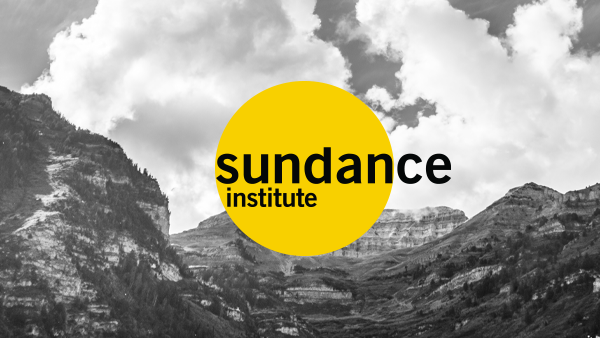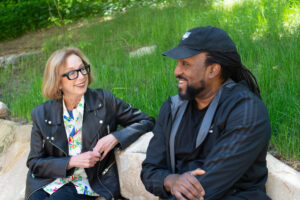Eric Hynes, Jeremy Kinser, and Nate von Zumwalt
Hi everyone, and welcome to the live blog for the 2014 Sundance Film Festival Awards Ceremony. We’re Eric Hynes, Jeremy Kinser, and Nate von Zumwalt, and we’ll be your eyes and ears for tonight’s festivities.
As it has for the past several years, the Awards Ceremony takes place a few miles north of Park City at the Basin Recreation Fieldhouse at Kimball Junction. It’s a vast hangar of a space, with party lights projected high into the metal rafters, and the floor split in half between a food buffet/gathering space and the event space proper, which is lined with more folding chairs than I’ve ever seen at a Closing Night ceremony. Does this mean that more filmmakers stuck around the Fest longer, thinking they’ve got a good shot at a prize tonight? Or did the unseasonably mild, snow-less weather make Park City more inviting than usual? In any event, the volunteers operating as ushers have more energy than anyone else in this swiftly filling room, dancing along to Le Freak and Justin Timberlake as if prizes were about to be given away for Best Hip Shake or Most Misplaced Hustle.
This year marked the 30th Anniversary of the Festival. In his introductory comments at the Opening day press conference a week ago last Thursday, Sundance Presidnet and Founder Robert Redford spoke of how the Sundance Film Festival has evolved over the past three decades. “Change is inevitable. You either resist it—we know who those people are—or you go with it,” he said. “We want to ride with that wave.”
In 1985, which was the first festival under the auspices of Sundance Institute, more than 80 features were presented, compared with 118 for this year. The doc jury was comprised of people named Frederick Wiseman, D.A. Pennebaker, and Barbara Kopple, and they gave top awards to Seventeen, Streetwise, and The Times of Harvey Milk, among others. The narrative jury included Peter Biskind, Robert Young, and Mirra Bank, and they honored a few small films called Blood Simple, The Brother From Another Planet, and Stranger Than Paradise. There were 10 awards total in 1985; this year there are 27
This year was also the 25th Anniversary of Festival Director John Cooper’s involvement with the Fest. At the same Day One press conference, Cooper made special mention of films that he’s been advocating for a great many years of his tenure. “Please pay attention to the World Cinema Competition,” he said, backed by what he considered to be a strong slate of Dramatic and Documentary films, which, along with films screening in the other sections, were drawn from 37 countries. Keep an eye out for this year’s winners in the World Cinema Competition, which should come up towards the beginning of the ceremony.
Updated 7:55 p.m.
A voice from the heavens introduces tonight’s masters of ceremonies, the husband and wife comedy team of Nick Offerman and Megan Mullally. Together they starred in last year’s U.S. Dramatic Competition film The Kings of Summer, and this year Offerman stars in Nick Offerman: American Ham.
Mullally walks out with a ukulele. Offerman has a guitar in its case at his feet. They talk about their sex lives as intertwined with indie film.
“Our frenzied coitus is the stuff of legend. There’s no place we’d rather get our swerve on than in Park City, Utah,” she says.
“We have seen your movies, and we have found them arousing,” he says.
“RyRy Reynolds, there was more than one pussy talking during your movie,” she says.
Offerman and Mululally’s back-and-forth moves towards James Franco, a fixture at Sundance but Nick notes that he doesn’t actually have a film in this year’s fest. “What if I told you he plays you in American Ham, and you didn’t even know it?” she says.
“Classic Franco,” he says.
Now it’s song time. Continuing to work blue, theirs is a ditty about indie films called “Weed and Pussy.”
“Look around at your neighbors and feel proud of yourselves. You’re here. Keep up the good work, please and thank you,” he says.
Mullally introduces the Executive Director of Sundance Institute, Keri Putnam.
“That’s a tough act to follow,” Putnam says. “This has been an amazing ten days—I hope you will all spread the word about the new work you saw here this week, and continue to support independent film in your own communities,” she says. “I hope you will also get involved with Sundance Institute all year long.”
Putnam announces the winners of the Sundance Institute/Mahindra Global Filmmaking Awards, given earlier in the week to emerging filmmakers from the World Cinema stage on the basis of their next screenplay.
From Vietnam and the UK, Hong Khaou for Monsoon.
From Denmark, Tobias Lindholm for A War.
From Australia, Ashlee Page for Archive.
From India, Neeraj Ghaywan for Fly Away Solo.
Additionally, the Sundance Institute/NHK Award went to Mark Rosenberg for Ad Inexplorata. Putnam introduces the Director of the Sundance Film Festival John Cooper.
Cooper thanks the 1,830 Festival Volunteers, making special mention of the “100 Club”—volunteers that gave over 100 hours of their time to this year’s Festival.
And this year’s Gayle Stevens Volunteer Award, given to a volunteer who has demonstrated a long-standing passion for and commitment to the work of the Institute (Stevens was an active member of the Utah Advisor Board for 18 years and the chair of it for four), was given at the start of the Festival to Gregory Walters, a veteran of seven Festivals.
“Let’s get all clear on this. If you’re a winner, you don’t have to thank everyone in the room. Your parents aren’t here. Let’s keep it moving,” he says about the coming awards speeches.
“We don’t judge success by whether your film sold. I talk to audiences and on that front you killed it this year. They laughed and cried and in some cases saw things they didn’t know they needed to see,” he says, to a wave of titters. “Thank you for being the amazing class of 2014.”
Cooper introduces the Director of Programming for the Sundance Film Festival, Trevor Groth.
Groth, in a signature argyle sweater, introduces the winner of the Alfred P. Sloan Feature Film Prize, which was announced earlier in the week. It’s a juried award presented to a director with an outstanding film focusing on science or technology as a theme, or depicting a scientist, engineer, or mathematician as a major character, which comes with a no-slouch cash award of $20,000.
Winner of the Alfred P. Sloan Feature Film Prize:
I Origins, written and directed by Mike Cahill
Cahill isn’t here, but producer Hunter Gray takes the stage.
“A wonderful thing happened during the making of this film. Mike became a father. So he’s where he should be, with his wife and newborn baby,” says Gray. Gray notes that this is Cahill’s second time as a Sloan Winner, having previously won for Another Earth. “I’ve never met anyone as passionate about science and film as Mike.”
Groth returns to talk about the Shorts Program, presented by YouTube. This year’s jury included Ania Trzebiatowska, Vernon Chatman, and Joshua Leonard.
The Shorts Awards were also given out in a separate ceremony earlier this week, and the winners were:
Short Film Special Jury Award for Direction and Ensemble Acting:
Burger, written and directed by Magnus Mork.
Short Film Special Jury Award for Non Fiction:
Love. Love. Love., directed by Sandhya Daisy Sundaram.
Short Film Special Jury Award for Unique Vision:
Rat Pack Rat, written and directed by Todd Rohal.
Short Film Jury Award: Animation:
Yearbook, written and directed by Bernardo Britto.
Short Film Jury Award: Non Fiction:
I Think This Is the Closest to How the Footage Looked, directed by Yuval Hamieri and Michal Vaknin.
Short Film Jury Award: International Fiction:
The Cut, written and directed by Geneviève Dulude-Decelles.
Short Film Jury Award: US Fiction:
Gregory Go Boom, written and directed by Janicza Bravo.
Short Film Grand Jury Prize:
Of God and Dogs, directed by the Abounaddara Collective.
Groth introduces Zach Papale from YouTube, who announces the winner of this year’s Audience Award, chosen from among 15 of the 2014 shorts that screened on YouTube throughout the Festival. Papale says that, “since Day One of the Festival, those 15 short films have collectively received more than 1.7 million views.”
Winner of the 2014 Shorts Audience Award, presented by YouTube:
Chapel Perilous directed by Matthew Lessner.
“This is kinda scary. Really scary actually. I’m not going to think about it,” says Lessner, who comes up with two of his cast members. “This is my third time back, and this was my best experience thus far.” He thanks YouTube and its audience. “It’s awesome to have people from all over the world see this.”
Updated 8:14 p.m.
Nick Offerman comes back on stage to introduce the World Cinema Films (he seems entranced by a slideshow of the competing titles “Those graphics are giving me an intense flashback,” he says. “I feel good.”), as well as the World Cinema Documentary Jury. Jurors include Caspar Sonnen, the head of new media and creator of the IDFA DocLab at the International Documentary Film Festival of Amsterdam, Sally Riley, the head of the Indigenous Department at ABC1 television in Australia and manager of Screen Australia’s Indigenous Department, and Andrea Nix Fine a filmmaker who with her husband and directing partner, Sean, won the 2013 Academy Award for best documentary short for their film Inocente. Their feature documentary, Life According to Sam, debuted at Sundance last year and War/Dance won the documentary Directing Award at the 2007 Sundance Film Festival, and was nominated for an Academy Award.
Sonnen, about the first award-winner: “A deeply troubling masterpiece with glimpses of joy and hope.”
Winner of the World Cinema Documentary Special Jury Award for Cinematic Bravery:
We Come As Friends, directed Hubert Sauper
Sauper: “I can’t thank my momma, she’s far away. I want my co-pilot on stage here. Where’s Barney [TK]? So we were in a flying tin can, in space over the Sudan. If you ever want to make a movie in space, this is the man. One of the finest cinematographers.”
Winner of the World Cinema Documentary Cinematography Award:
Happiness, cinematography by Thomas Balmes and Nina Bernfeld. Directed by Thomas Balmes
Bernfeld thanks Balmes for taking her on for the project, and Bernfeld thanks his wife and children.
Winner of the World Cinema Documentary Editing Award:
20,000 Days on Earth, edited by Jonathan Amos
Jonathan Amos isn’t here.
Winner of the World Cinema Documentary Directing Award:
20,000 Days on Earth, directed by Iain Forsyth and Jane Pollard
Forsyth and Pollard send a video message from the UK. “It’s the icing on the cake of what’s been a tremendous Sundance for us,” says Pollard.
“They won’t give any directing awards for this,” Forsyth says, of the lo-fi clip.
Winner of the World Cinema Documentary Grand Jury Prize:
Return to Homs, directed by Talal Derki
Derki isn’t here, but a producer of the film accepts the award.
“It was a very long journey until we were here,” he says. “This really gives us hope, us and everyone under siege in Homs and other places. It gives us hope that some day the siege will end. That some presidents can be ousted. And some other president in another place can do something finally.”
Updated 8:24 p.m.
Megan Mullally comes back on stage to introduce the World Cinema Dramatic Jury, which includes Carlo Chatrian, a celebrated journalist, author, film critic and programmer who is the current Artistic Director of the Locarno International Film Festival, Sebastian Lelio, a Chilean filmmaker whose fourth feature, Gloria is currently nominated for the Independent Spirit award as best foreign language film, and Nansun Shi, a prolific producer who Variety named one of the 50 most influential independent filmmakers around. Her films include the blockbuster hits Infernal Affairs and Young Detective Dee: Rise of the Sea Dragon.
“We’ve had a nice 10 days, enjoying cinema,” says Chatrian.
Winner of the World Cinema Dramatic Special Jury Award for Ensemble Performance:
God Help the Girl, directed by Stuart Murdoch, and starring Emily Browning, Olly Alexander, Hannah Murray, Pierre Boulanger, and Cora Bissett.
Murdoch isn’t here. But he sends a video message.
“Sorry I left town so soon. I would have stayed if I’d known we were going to get an award,” he says, holding his cooing baby.
Winner of the World Cinema Dramatic Cinematography Award:
Lilting, cinematography by Ula Pontikos
Ula isn’t here, but the producer accepts.
Winner of the World Cinema Dramatic Screenwriting Award:
Blind, written and directed by Eskil Vogt
Vogt isn’t here either, but he sends a video message. Another one holding a baby! This one seems both simultaneously more content than Murdoch’s and more demonstrative with spit up.
“A sign that we didn’t mess it up along the way,” he says about winning for screenplay.
Winner of the World Cinema Dramatic Directing Award:
52 Tuesdays, directed by Sophie Hyde
Hyde thanks her “beautiful cast” as well as her team and crew. Thanks her investors for “taking a huge risk with us.”
Winner of the World Cinema Dramatic Grand Jury Prize:
To Kill a Man, directed by Alejandro Fernandez Almendras
Almendras sends a message – another with a baby! An older child who’s sticking his feet in the camera. “Show them your feet,” Almendras says.
“We won!!!” they say. The boy also wonders if his mother and brother and grandma won.
He sends a thank you “to all the people of the festival of the snow.”
“I guess you understand the reason why I’m not there now,” he says.
Updated 8:40 p.m.
Offerman comes back on stage to present a montage of films in the Next section, which is devoted to films of bold innovative storytelling that signal a greater next wave in American Cinema. Then he announces the winner of the Next audience award.
Winner of the Audience Award: Best Of NEXT
Imperial Dreams, directed by Malik Vitthal
Vitthal: “I was in the back looking for dental floss,” he says after a long wait to take the stage. “Thanks to Watts for opening its arms to this project. It’s an important story that needs to get out there.”
Mullally is back to introduce actress Felicity Huffman, who will announce the winners of the World Cinema audience awards. Huffman is an Oscar nominated and Golden Globe winning actress best known for her roles on Sports Night and Desperate Housewives. This year she appears in Rudderless, which was directed by her husband William H. Macy.
Winner of the Audience Award for World Cinema Documentary:
The Green Prince, directed Nadav Schirman
Schirman is also in the back. “Run dude, run,” says Huffman.
Schirman: “I want to thank the audiences. Because we made this film for audiences around the world. It’s a very exciting time to be making documentaries. Because everything is possible in this genre.”
Winner of the Audience Award for World Cinema Dramatic:
Difret, directed by Zeresenay Berhane Mehari
Mehari: “We do have a baby. He’s over there,” he says, pointing offstage. “Today he’s 8 months old. He has a white shirt and bowtie.”
“When we started this project, we heard that people would not want to watch this sort of a story. Thank you very much, your voice goes a long way. We made this film with the support of the audience,” he says.
“We always say we had twins, the baby and the film,” his partner and collaborator says.
Offerman is back on stage to introduce a montage of U.S. doc and narrative competition films. Then he brings out William H. Macy, who’s here to announce the U.S. Competition Audience Awards, presented by Acura. Macy is an Academy Award and Golden Globe nominee and a SAG Award and Emmy Winner. He currently stars in the Showtime series Shameless, and is making his feature film directorial debut with Rudderless, which is the Closing Night Film of the 2014 Sundance Film Festival.
Winner of Audience Award: U.S. Documentary:
Alive Inside, directed by Michael Rossato-Bennett
Rossato-Bennett: “This has been an overwhelming experience for me. The beauty and open hearts of people who came up to me.”
“I made this film because it moved me, and I didn’t know how big the topic was.”
“I made this film, most of it, in my bedroom, across from my bed,” he says, and he thanks his wife for not killing him.
Winner of the Audience Award: U.S. Dramatic:
Whiplash, directed by Damien Chazelle
“This is awesome,” the boyish Chazelle says. “This was not an easy film to make, and not an easy film to convince people to make.”
Thanks actors Miles Teller and J.K. Simmons “above all.”
Updated 8:50 p.m.
Mullally is back on stage to introduce Charlotte Cook, the Director of Programming for Hot Docs, North America’s largest documentary festival, a member of this year’s U.S. Documentary Jury.
Winner for U. S. Documentary Special Jury award for Intuitive Filmmaking:
The Overnighters, directed by Jesse Moss
Moss: “I’d like to thank the Sundance family for believing in this film when we really needed someone to believe in it.”
Winner of the U.S. Documentary Special Jury Award for Use of Animation:
Watchers in the Sky, directed by Edet Belzberg
Belzberg thanks all of the animators, and Sundance “for its support of filmmakers.”
Offerman is back to introduce Dana Stevens, the film critic at Slate.com, the co-host of the Slate Culture Gabfest podcast and of the Slate Spoiler Special podcast. Stevens is member of this year’s U.S. Dramatic Jury.
“It’s been an honor and joy to serve on this jury, and it’s not been an easy decision,” Stevens says.
Winner of the U.S. Dramatic Special Jury Award for Musical Score Musical Score:
Kumiko, the Treasure Hunter, composed by The Octopus Project
Directors the Zellner brothers accept on their behalf.
Winner of the U.S. Dramatic Special Jury Award for Breakthrough Talent:
Dear White People, directed by Justin Simien
Simien: “Wow! Ok. All right. That’s crazy. Thank you so much. To everybody in general. So grateful to have a platform for this film. This is a dream come true. Thank you.”
Mullally is back to introduce Kahane Cooperman, a documentary filmmaker and the original and current producer of The Daily Show with Jon Stewart for which she has won ten Primetime Emmy Awards and two Peabodys.
Winner of the Cinematography Award: U.S. Documentary:
E-TEAM, Ross Kauffman, Director of Photography; Rachel Beth Anderson, Ross Kauffman, Cinematographers
Kauffman: “Oh I don’t know what to say. This is wild, I didn’t expect it.”
“To all the theater projectionsts, we love you.” Thanks his producers, his crew, and “the editor makes the camera work,” referring to editor David Teague. Thanks the members of the Human Rights Watch E-TEAM.
Offerman is back to introduce Peter Saraf, producer of many Sundance hits such as The Kings of Summer, Safety Not Guaranteed and Little Miss Sunshine. He’s been nominated for multiple Academy Awards and Golden Globes and has won the Independent Spirit, Gotham, and Producers Guild of America awards.
“This film was actually shot on film,” says Saraf, to applause.
Winner of the Cinematography Award: U.S. Dramatic:
Low Down, cinematography by Christopher Blauvelt
Director Jeff Preiss accepts.
“Chris is a beautiful man. His cinematography and his person are the same thing.” Met him and agreed he had to shoot the film “in a half second.”
Updated 9:10 p.m.
Mullally introduces Jonathan Oppenheim, an editor and producer of feature documentaries who has participated as both an advisor and a fellow at the Sundance Institute Documentary Edit and Story Lab. His work includes the Sundance hits Paris is Burning, Sister Helen, The Oath and Children Underground which was nominated for the Academy Award.
Winner of the Editing Award: U.S. Documentary:
Watchers of the Sky, edited by Jenny Golden and Karen Sim
Golden and Sim: “Coming from Jonathan Oppenheim, who’s one of the legendary editors of our time, it’s an absolute honor.”
Saraf is back to give out another award.
Winner of the Waldo Salt Screenwriting Award: U.S. Dramatic:
The Skeleton Twins, screenplay by Craig Johnson and Mark Heyman
Johnson: “We started this eight years ago when we were students at NYU,” he says about his collaboration with Mark Heyman.
Mullally introduces Morgan Neville, three-time Grammy nominee for his music documentaries. His film Troubadours, screened at the 2011 Sundance Film Festival, and he was back last year with 20 Feet from Stardom, which is currently nominated for the Academy Award for Best Documentary.
Winner of the Directing Award: U.S. Documentary:
The Case Against 8, directed by Ben Cotner and Ryan White
White: “Ben and I met at this film festival 5 years ago. If you’d told us we’d be here five years later we’d have thought you were not a smart person.”
“We were incredibly lucky to follow inspiring people around. Thanks crew. Thanks plaintiffs. You’ve inspired us and changed the world. We hope all LGBT Americans can walk in the same footsteps that you just did,” he says about the film’s subjects.
Offerman introduces Lone Scherfig. She wrote and directed Denmark’s fifth Dogma film, Italian for Beginners, which won the Silver Bear at the 2001 Berlin Film Festival. She also directed An Education, which won the World Cinema Audience Award at the 2009 Sundance Film Festival and received three Academy Award nominations including best picture.
Winner of the Directing Award: U.S. Dramatic:
Fishing Without Nets, directed by Cutter Hodierne
Massive applause from the back right of the room. Clearly a strong Fishing Without Nets contingent still in town.
Hodierne celebrating on stage with two of his actors. “This was my first feature film. We went to the opposite side of the world and met these two guys who became tow of my best friends. You’re not a director without your actors. These guys came from Kenya. If they could speak English they would really be talking now.”
Actor: “Sorry everybody. Language, English, too small. I love you Sundance. I love you everybody. I love you. I love you!”
Mullally introduces Grammy Award–winning singer/songwriter and international recording artist Tracy Chapman. “A fiercely dedicated social activist with a passion for documentary films,” says Mullally.
“Thank you for the hugs and Sundance love,” Chapman says.
Winner of the U.S. Grand Jury Prize: Documentary:
Rich Hill, directed by Tracy Droz Tragos and Andrew Droz Palermo
Tragos and Palermo come up with two members of their crew.
Tragos: “I didn’t think that anybody saw our film, I don’t know.” Clearly shaken. “It’s a small film but we’ve got a big heart. We dedicate this to thte families in Rich Hill, Missouri. Three boys and their families who were so brave. Who revealed some really hard, tough stuff. Thank you fur letting them into your hearts.”
Palermo: ‘I’m not normally the talker among the two of us.” Palermo dedicates the prize to one of the mothers in the film, who died ten days before the festival.
Offerman is back to introduce Leonard Maltin, who’s best known for his annual Leonard Maltin’s Movie Guide and his 30-year run on television’s Entertainment Tonight.
Iconically white-haired and cadenced Maltin notes that Bryan Singer left early because he fell ill.
Winner of the U. S. Grand Jury Prize: Dramatic:
Whiplash, directed by Damien Chazelle
“Now I’ve got to thank more people I guess,” Chazelle says, in collecting his second award. “My first time I was in Park City was last year with my short,” and he thanks the shorts programming team for starting things off a year ago. And that’s it. “It’s time to party. Nick and I hope you join us in our Mountain Time fuck ram,” are Mullally’s final words.




